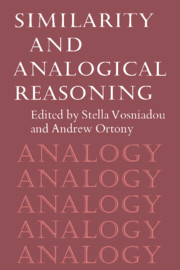Book contents
- Frontmatter
- Contents
- Preface
- List of contributors
- Similarity and analogical reasoning: a synthesis
- Part I Similarity and the structure of concepts
- Part II Analogical reasoning
- Part III Similarity and analogy in development, learning, and instruction
- 14 Analogical learning and transfer: What develops?
- 15 Analogical reasoning as a mechanism in knowledge acquisition: a developmental perspective
- 16 Remindings in learning and instruction
- 17 New approaches to instruction: because wisdom can't be told
- 18 Multiple analogies for complex concepts: antidotes for analogy-induced misconception in advanced knowledge acquisition
- 19 Comments on Part III: The activation and acquisition of knowledge
- Afterword: Comments on Parts I, II, and III: A framework for a theory of comparison and mapping
- Name index
- Subject index
17 - New approaches to instruction: because wisdom can't be told
Published online by Cambridge University Press: 22 October 2009
- Frontmatter
- Contents
- Preface
- List of contributors
- Similarity and analogical reasoning: a synthesis
- Part I Similarity and the structure of concepts
- Part II Analogical reasoning
- Part III Similarity and analogy in development, learning, and instruction
- 14 Analogical learning and transfer: What develops?
- 15 Analogical reasoning as a mechanism in knowledge acquisition: a developmental perspective
- 16 Remindings in learning and instruction
- 17 New approaches to instruction: because wisdom can't be told
- 18 Multiple analogies for complex concepts: antidotes for analogy-induced misconception in advanced knowledge acquisition
- 19 Comments on Part III: The activation and acquisition of knowledge
- Afterword: Comments on Parts I, II, and III: A framework for a theory of comparison and mapping
- Name index
- Subject index
Summary
The subtitle of this chapter is borrowed from an article published in 1940 by Charles L. Cragg. He begins with the following quotation from Balzac:
So he had grown rich at last, and thought to transmit to his only son all the cut-and-dried experience which he himself had purchased at the price of his lost illusions; a noble last illusion of age.
Except for the part about growing rich, we find that Balzac's ideas fit our experiences quite well. In our roles as parents, friends, supervisors, and professional educators we frequently attempt to prepare people for the future by imparting the wisdom gleaned from our own experiences. Sometimes our efforts are rewarded, but we are often less successful than we would like to be and we need to understand why.
Our goal in this chapter is to examine the task of preparing people for the future by exploring the notion that wisdom can't be told. Our arguments are divided into four parts.
First, we consider in more detail the notion that wisdom cannot be told. The argument is not that people are unable to learn from being shown or told. Clearly, we can remind people of important sets of information and tell them new information, and they can often tell it back to us. However, this provides no guarantee that people will develop the kinds of sensitivities necessary to use relevant information in new situations.
- Type
- Chapter
- Information
- Similarity and Analogical Reasoning , pp. 470 - 497Publisher: Cambridge University PressPrint publication year: 1989
- 178
- Cited by



